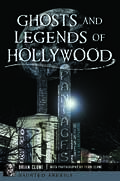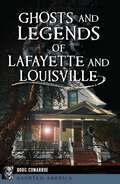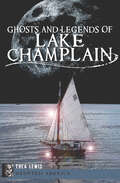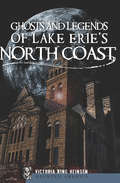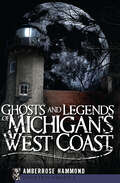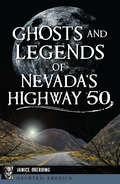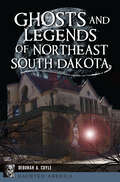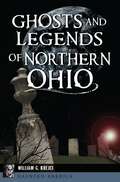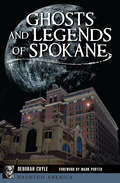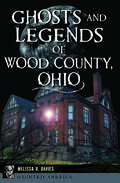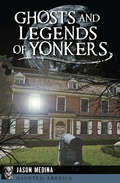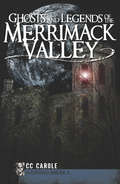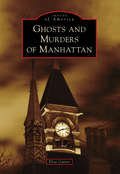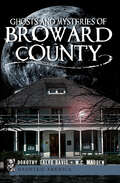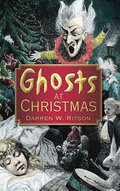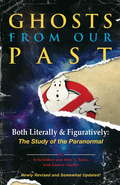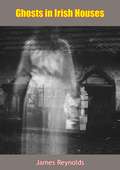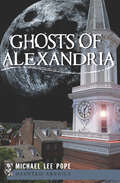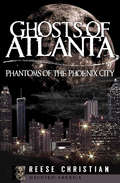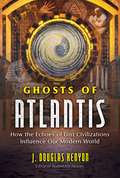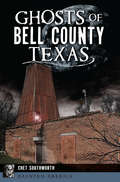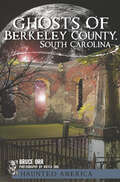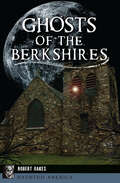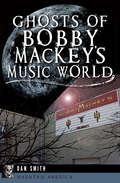- Table View
- List View
Ghosts and Legends of Hollywood (Haunted America)
by Brian CluneCursed awards, haunted estates, and deadly sets. Hollywood is supposed to be the place where dreams come true, but it's also where nightmares come to life. Spirits haunt the halls of renowned studios, legendary cafes, and lavish estates, while rumors of curses lurk in the shadows of the rich and famous. It's said that stars like James Dean, Carrie Fisher, and Prince once predicted their own deaths, while slain screenwriter Paul Bern tried in vain to warn Sharon Tate about her own fate. Ghosts reportedly linger in the corners of the El Coyote Café and the Falcon Lair boasts sightings of Rudolph Valentino long after his death. Join author and paranormal historian Brian Clune for a star-studded tour of the dark side of Hollywood.
Ghosts and Legends of Lafayette and Louisville (Haunted America)
by Doug ConarroeExplore ghastly history and lasting lore! The legend of local miner Teodor Glava, the Lafayette Vampire, has reached near cult status, with people from all over the country visiting his gravesite. Buried bootleggers lost to an underground tunnel explosion purportedly haunt Louisville's Main Street. Local teenagers explore the outskirts of Old Town Lafayette to confront the legendary La Llorona, who preyed on curious children and adults. And, an infamous Headless Horseman stalks Spruce Lane, a dirt road in old town Louisville. Sorting out fact from fiction with some tantalizing first-hand accounts, author Doug Conarroe takes a critical look at these and other myths, legends and ghost tales.
Ghosts and Legends of Lake Champlain (Haunted America)
by Thea LewisThe author of Haunted Burlington shares Lake Champlain&’s chilling history—from swashbuckling spirits to Champ, &“North America&’s Loch Ness Monster.&” Lake Champlain is located between New York&’s majestic Adirondacks and Vermont&’s famed Green Mountains. Yet despite the beauty of this region, it has been the site of dark and mysterious events; it is not surprising that some spirits linger in this otherwise tranquil place. Fort Ticonderoga saw some of early America&’s bloodiest battles, and American, French and British ghosts still stand guard. A spirit walks the halls of SUNY Plattsburgh, even after his original haunt burned in 1929. Champlain&’s islands—Stave, Crab, Valcour and Garden—all host otherworldly inhabitants, and unidentified creatures and objects have made appearances on the water, in the sky and in the forests surrounding the lake. Join Burlington&’s Thea Lewis as she explores the ghosts and legends that haunt Lake Champlain. Includes photos! &“For Lewis, a gifted storyteller, a good story makes a haunted place all the more compelling.&” —Happy Vermont
Ghosts and Legends of Lake Erie's North Coast (Haunted America)
by Victoria King HeinsenCall it Lake Eerie, according to this book &“filled with ghostly encounters of the friendly kind with a bit of local history mixed in&” (Toledo Blade). The residents of Lake Erie&’s North coast have trouble leaving—even after they die. The area is flooded with the spirits of locals, some friendly, some not. See the sorrowful eyes of the Hauntingly Beautiful High School Student, who floats the corridors looking for her lost boyfriend, and head to an old Port Clinton hotel to watch the ghost of a maintenance man wander haphazardly through the inn, making routine repairs. Read about the figure that lurks in the clock of the Port Clinton Courthouse every night, never moving, simply watching, until disappearing with the sun. Local ghost tour guide Victoria King Heinsen has a personal connection with every story, and her firsthand accounts will turn every paranormal skeptic into a believer. Includes photos!
Ghosts and Legends of Michigan's West Coast (Haunted America)
by Amberrose HammondStories and photos that bring the spooky history of Western Michigan to life . . . Western Michigan is home to some of the state&’s most picturesque places—and also some of its most chilling tales. Ghost story researcher Amberrose Hammond exposes the mysterious and spirit-ridden world of many beloved Michigan destinations as she skillfully weaves narratives of a world unseen by most. From the lingering spirit forever working in the Grand Theatre and the band of melon-headed children prowling the Saugatuck Dunes State Park to the lights of the Lake Forest Cemetery staircase waiting to reveal one&’s place in the afterlife, these tales are sure to give pause to anyone daring enough to experience these hauntingly beautiful spots . . . after dark.
Ghosts and Legends of Nevada's Highway 50 (Haunted America)
by Janice OberdingThe 287-mile stretch of highway that runs east to west across Nevada's desert is billed as the "Loneliest Road in America." But those who explore it find there is plenty to discover along the way in the towns of Austin, Eureka, Ely, Fallon and Fernley. Every one of these places has its own unique history, ghosts and stories to tell. From the sordid lynching of Richard Jennings to the humorous legend about a famous sack of flour, author Janice Oberding treks across Highway 50 seeking spirits and uncovering the tales of Singing Sand Mountain, the Red-Headed Giants, the Giroux Mine Disaster and many more.
Ghosts and Legends of Northeast South Dakota (Haunted America)
by Deborah CuyleGhouls of the Glacial Lakes and Prairie Region Buried in the annals of the region are torrid tales, disasters and the unexplained. At historic Fort Sisseton, the old hanging tree and a phantom buffalo soldier are just a few of its spectral stories. Partygoers from over a century ago still linger at Aberdeen's Easton Castle. De Smet's historic Laura Ingalls Wilder homestead attracts thousands of visitors annually, many unaware of its familial spirts. Locals in Watertown still debate whether the apparition at the Goss Opera House is that of a traveling performer named Annie or murder victim Maud Alexander, who was set on fire by her own son. Victims of a 1940 train wreck between Milbank and Marvin seemingly never left the scene of the accident. And Captain Luff of The Muskegon disaster can be seen mourning on the banks of Big Stone Lake. Author Deborah Cuyle chronicles the area's most fascinating and perplexing lore.
Ghosts and Legends of Northern Ohio (Haunted America)
by William G. KrejciHauntings and eerie tales abound in northern Ohio. Chillings legends, mysteries and hauntings.Does Esther Hale, believed to have been executed for witchcraft, really haunt Columbiana County's Bowman Cemetery? Is Lonesome Lock on the Ohio and Erie Canal as haunted as rumors say? Do restless spirits stalk the rooms at the Wolf Creek Tavern in Norton and the Rider's Inn of Painesville? Do the ruins of Gore Orphanage echo with the ghastly wails of children said to have died in a fire long ago? Author William G. Krejci guides this supernatural journey through the most chilling legends of northern Ohio. Some stories are debunked. Some long-standing mysteries are solved. Some new mysteries come to light.
Ghosts and Legends of Spokane (Haunted America)
by Deborah CuyleSpokane is brimming with haunted buildings and shades reluctant to leave their beloved city. Patsy and Mary Clark have refused to leave their glorious mansion even after their passing, and the ghost of Ellen, who plunged to her death from a skylight in 1920, still whispers to current guests at the extravagant Davenport Hotel. In Greenwood Cemetery, a set of haunted stairs attracts visitors who come to see if the spirits will prevent them from reaching the top. Join author Deborah Cuyle as she explores the Lilac City's haunted landmarks and the colorful stories of its former residents.
Ghosts and Legends of Wood County, Ohio (Haunted America)
by Melissa R. DaviesExplore the origins of Wood County lore. Ghostly tales abound from fallen war heroes of Bowling Green State University to the darkened woods of Holcomb Road. The spirit of Frank Simonds, a venerated World War I veteran who nearly got away with murder, may linger around Main Street in Bowling Green. A soldier who died in a desperate attempt to save hundreds still guards Fort Meigs. Though nothing stands there now, the spot of the infamous Woodbury House remains a terror--just as it was for the earliest settlers in the area. Wonder-seeker and amateur folklorist Melissa Davies reveals the stranger side of local history.
Ghosts and Legends of Yonkers (Haunted America)
by Jason MedinaFormer NYPD officer and current ghost hunter Jason Medina travels up the Hudson River to a hotbed of paranormal activity. The quiet New York suburb of Yonkers hides a history of hauntings. Now converted into apartments, old Public School 13 is the site of strange apparitions that may be ghosts of former students and teachers who died in a tragic fire. The Boyce Thompson Institute&’s lofty goal of solving world hunger was never met, and unfulfilled spirits are said to lurk in its abandoned laboratory. Wealthy colonial landowners still watch over stately historic homes like Philipse Manor Hall. Even the iconic Untermyer Park is a playground for the otherworldly. Local ghost investigator Jason Medina reveals these and other ghosts of Yonkers.
Ghosts and Legends of the Merrimack Valley (Haunted America)
by Cc CaroleC.C. Carole has visited some of the most historic places in the Merrimack Valley and has found them buzzing with the ghostly energy and presence of those who came before. Join C.C. as she recounts her adventures and paints a historical backdrop of the region's haunts. Discover the legend of the Pennacook chief Passaconaway, said to be over one hundred years old and possessed of magic that could make water burn and trees dance. Investigate the eerie sounds and shadowy figures reported in the old safe houses and tunnels of the Underground Railroad. Visit the Rosewood Country Inn in Bradford and its lingering spirits of glamorous Hollywood stars, and listen for the echoes of toe-tapping performers at Canobie Lake Park's Dancehall Theatre. As C.C. treks across New Hampshire and Massachusetts, the region's historic spirits reveal themselves in surprising ways.
Ghosts and Murders of Manhattan (Images of America)
by Elise GainerDiscover the darker side of New York City history with this collection of stories and photos. Amid the bustle of the city&’s ever-changing landscape, Manhattan&’s past still whispers. At Fraunces Tavern, George Washington&’s emotional farewell luncheon in 1783 echoes in the Long Room. Gertrude Tredwell&’s ghost appears to visitors at the Merchant&’s House Museum. Long since deceased, Olive Thomas shows herself to the men of the New Amsterdam Theatre, and Dorothy Parker still keeps her lunch appointment at the Algonquin Hotel. In other places, it is not the paranormal but the abnormal—violent acts by gangsters, bombers, and murderers that linger in the city&’s memory. Some even believe that Jack the Ripper and the Boston Strangler hunted here. The historic images and true stories in Ghosts and Murders of Manhattan explores the people and events that shaped this city, and live in the shadows of its majestic skyline.
Ghosts and Mysteries of Broward County (Haunted America)
by W. C. Madden Dorothy Salvo DavisResidents of and visitors to Broward County might not realize how many haunting tales are connected to the many popular beaches, roadways and destinations here. What really happened to six aircraft that went missing in what might be one corner of the Devil's Triangle? Does a shape-shifting panther man lurk in the wild places off the Dixie Highway? Just how many startling specters have appeared over the years at the county's restaurants, inns and buildings? Authors Dorothy Salvo Davis and W.C. Madden reveal these stories and more in Ghosts and Mysteries of Broward County.
Ghosts at Christmas
by Darren W. RitsonA spine-chilling collection of ghostly tales associated with the festive season. From Charles Dickens' famous A Christmas Carol to Tim Burton's The Nightmare Before Christmas, the festive season has long been closely associated with ghostly tales. In this fascinating work Darren W Ritson looks not only at the fictional treatment of Christmas ghosts but also at a host of true-life tales from across the country.
Ghosts from Our Past
by Andrew Shaffer Abby L. Yates Erin GilbertAs seen in the Sony Pictures 2016 film Ghostbusters, the ultimate guide to identifying, understanding, and engaging with any paranormal activity that plagues youYears before they made headlines with the Ghostbusters, Erin Gilbert and Abby L. Yates published the groundbreaking study of the paranormal, Ghosts from Our Past. Once lost to history, this criminally underappreciated book is now back in print, revised and somewhat updated for the new century.According to Gilbert and Yates, "extraordinary claims require extraordinary evidence," and whether you're a believer or a skeptic, you'll find the information you're seeking right here in this extraordinary book, including:· The childhood experiences that inspired Erin and Abby's lifelong passion for the scientific study of the paranormal;· The history of ghosts and other supernatural entities, the science that explains their existence, and profiles of the groundbreaking paranormal researchers who have investigated them;· An illustrated guide to Class I through Class VII ghosts;· Helpful sidebars like "A Ghost by Any Other Name" and "Ectoplasm Cleanup Tips";· Updates including "The Ghostbusters' Arsenal" by Jillian Holtzmann and "Haunted History" by Patty Tolan;· A new Ghostbusting Resources appendix, featuring the "Paranormal Quickstart Guide", "Is It a Ghost? A Handy Quiz", "A Supernatural Stakeout Journal", "The Devil's Dictionary: Paraterminology You Need to Know"; and more.With this helpful--and hilarious--official Ghostbusters guide in hand, you'll be prepared for almost any spirit, spook, or spectre that comes your way. As for the rest, you know who to call.From the Trade Paperback edition.
Ghosts in Irish Houses
by James ReynoldsTWENTY-TWO GHOSTLY TALES OF IRISH DEMONS, SPIRITS AND HAUNTED CASTLES--BY THE AUTHOR OF GHOSTS IN AMERICAN HOUSES James Reynolds has selected and retold these eerie folk tales from a collection of more than two hundred gathered during his life in Ireland. Here are the ghosts and demons that have flourished from the tenth to the twentieth century--the horrible, gluttonous ghost of Jason Bannott; the harpies of "the Ghostly Catch"; the madly comic ghosts of the O'Haggerty twins--all the. ghosts that midnight fancy shivers to imagine.
Ghosts in Irish Houses: A Collection Of Ghostly Folk Tales
by James Reynolds22 Folk Tales from Ireland retold and illustrated by the author.One of Irish-American writer James Reynolds’ best works is this lively compilation of Irish ghost stories that reflects the rich Celtic imagination. First published in 1947, this compilation draws from his personal collection of over 200 tales, ranging from the tenth to the twentieth centuries, these 22 yarns are a mix of the eerie, the terrifying, and the madly comic.In “The Bloody Stones of Kerrigan’s Keep,” vengeful spirits from a centuries-old massacre terrorize all who come close to their fortress grave. In “The Headless Rider of Castle Sheela,” the ghost of a beheaded horseman continues to haunt his castle every Christmas day. You’ll meet the demonic harpies of “The Ghostly Catch,” the giddy spirits of the fashionable O’Haggerty twins, and the gluttonous ghost of Jason Bannott. Other tales include “The Weeping Wall,” “The Bridal Barge of Aran Roe,” “Mrs. O’Moyne and the Fatal Slap,” and more. Enhanced by Reynolds’ illustrations of Irish houses and their residents—both ghostly and human—this anthology is a treasure to savor.
Ghosts of Alexandria (Haunted America)
by Michael Lee PopeThe award-winning journalist and author of Hidden History of Alexandria, D.C. combs through the haunted past of this Virginia colonial town. The ghost of a Revolutionary War spy that fosters a centuries-old grudge against the British, two young lovers parted by fire but reunited in death and Union and Confederate soldiers who still battle at the Hotel Monaco are among the haunts of Alexandria, Virginia. Beside the Potomac and the twice-blooming wisteria, local author Michael Lee Pope takes readers on a thrilling journey with his collection of historic ghost lore. Join him as he searches for the identity of the Female Stranger of Gadsby&’s Tavern and wanders the lonely halls of Woodlawn Plantation to encounter Alexandria&’s restless souls. Includes photos! &“A thrilling journey . . . [A] Halloween crowd-pleaser.&” —Local Kicks
Ghosts of Atlanta: Phantoms of the Phoenix City (Haunted America)
by Reese ChristianA world famous psychic medium and cold case researcher unravels the history and mystery that make Georgia&’s capital city a center of the supernatural. Do the ghosts of Civil War soldiers still march through the mists of Kennesaw National Battlefield on the outskirts of Atlanta? Can those who listen still hear the voices of the guests who died in the devastating Winecoff Hotel fire of 1946? Does the spirit of a young boy still ride the &“black horse&” on the Riverview Carousel at Six Flags Over Georgia? Drawing on her work with the Cold Case Investigative Research Institute at Bauder College and Ghost Hounds Paranormal Research Society, elite psychic medium and cold case researcher Reese Christian writes of the tragic past and the haunted present of Greater Atlanta. From Peachtree Street in the heart of downtown to the plantations and battlefields surrounding the city, join her in discovering the twisted histories of some of Atlanta&’s most infamous landmarks and forgotten moments. Includes photos!
Ghosts of Atlantis: How the Echoes of Lost Civilizations Influence Our Modern World
by J. Douglas Kenyon• Reveals evidence of advanced ancient technology, anomalous ancient maps, time travel, crystal science, ancient Armageddon, and Atlantis in the Bible • Explores the true age of the Sphinx, the Stone Age high-tech found at Gobekli Tepe, the truth of Rapa Nui (Easter Island), the Zep Tepi monuments of Egypt, the mysteries of the Gulf of Cambay, and what lies beneath the ice of Antarctica • Examines the advanced knowledge of the ancients and how the search for Atlantis and other lost worlds reflects the search for the lost soul of humanity We live within the ruins of an ancient civilization whose vast size has rendered it invisible. Remembered in myth as Atlantis, Lemuria, or other lost world archetypes, the remains of this advanced civilization have lain buried for millennia beneath the deserts and oceans of the world, leaving us many mysterious and inexplicable clues. Investigating the perennial myth of a forgotten fountainhead of civilization, J. Douglas Kenyon presents extensive physical and spiritual evidence of a lost great culture, the collective amnesia that wiped it from planetary memory, and the countless ways ancient catastrophes still haunt modern civilization. He explores evidence of advanced ancient technology, anomalous ancient maps, extraterrestrial influence, time travel, crystal science, and the true age of the Sphinx. He examines evidence of Atlantis in the Bible and ancient Armageddon, the Stone Age high-tech found at Gobekli Tepe, the truth of Rapa Nui (Easter Island), the Zep Tepi monuments of Egypt, the mysteries of the Gulf of Cambay, and what lies beneath the ice of Antarctica. He looks at extinction events, Earth&’s connection with Mars, and how our DNA reveals that humanity has had enough time to evolve civilization and lose it more than once. Exploring the advanced esoteric and spiritual knowledge of the ancients, Kenyon shows that the search for Atlantis and other lost worlds reflects the search for the lost soul of humanity. Drawing upon Velikovsky&’s notion of a species-wide amnesia caused by the trauma of losing an entire civilization, he reveals how the virtual ruins of a lost history are buried deep in our collective unconscious, constantly tugging at our awareness. As Kenyon reveals, by overcoming &“the Great Forgetting,&” humanity can find its way out of the haunted labyrinth in which we find ourselves lost today and rediscover the heights of spiritual and technological advancement of our ancient ancestors.
Ghosts of Berkeley County, South Carolina (Haunted America)
by Bruce OrrBerkeley County, just like its sister county of Charleston, is steeped in history and rich in legend and lore. With Native American beginnings and later infused with colonial and Gullah cultures, Berkeley has seen many people come to reside. And with each of these diverse cultures came the eerie tales of ghosts, ghouls and goblins. Now, for the first time, Berkeley County ghost stories have been collected in a single volume bound to frighten and chill even the bravest of readers. Join local author and investigator Bruce Orr as he recounts the spine-tingling stories behind these apparitions, including the spirits of early colonists that still linger in the pines, the feared Cymbee water spirits of the Gullah culture and the dreaded Cherokee witch Spear Finger, who craves the livers of unsuspecting victims.
Ghosts of Berkshires (Haunted America)
by Robert Oakes&“You&’ll never look at the region the same way again after reading about the tunnel from hell, toe-tugging spirits, and the curse of the mummy.&” —The Boston Globe Before it became a haven for arts and culture, the Berkshires was a rugged, sparsely populated frontier. From the early days of Revolutionary fervor and industrial enterprise to today&’s tourism, many chilling stories remain. A lost girl haunts a cemetery in Washington, and mysterious spirits still perform at Tanglewood. From the ghostly halls of the Houghton Mansion to the eerie events at the Hoosac Tunnel, residents and visitors alike have felt fear and awe in these hills, telling tales of shadow figures, disembodied voices and spectral trains. Author Robert Oakes, who has given ghost tours at The Mount in Lenox for more than a decade, leads this spirited journey through history. &“The rich history of this region—spanning more than two centuries—includes spine-tingling tales from almost every town in the county. Oakes culled many of them for his book, which touches on myriad metaphysicals, including &‘The Undead Hessian of Egremont,&’ &‘Highwood&’s Ghost at Tanglewood,&’ and &‘The Ghostly Guest in 301: The Red Lion Inn&’—each of which will inspire readers to &‘peer into the shadows beyond the beam of [their] flashlight.&’&” —The Berkshire Edge
Ghosts of Bobby Mackey's Music World (Haunted America)
by Dan SmithThe chilling story of a Kentucky nightclub and its dark and haunted history . . . photos included. Over the years, Bobby Mackey&’s Music World has played host to countless real-life horror stories and a string of criminal activity. The site has been the location of death and destruction since the nineteenth century, including illegal lynchings and a bridge collapse killing forty-one men. Illegal gambling and liquor abounded when it later served as the Bluegrass Inn. In more recent years, mafia bosses turned it into a nightclub known as the Latin Quarter. Beginning with the caretaker who fell under a demonic possession to more recent encounters between patrons and the paranormal, author Dan Smith revives the chilling stories that make it the most haunted nightclub in America.
